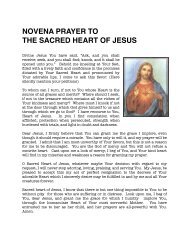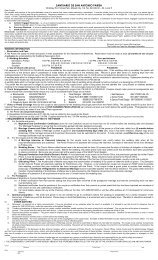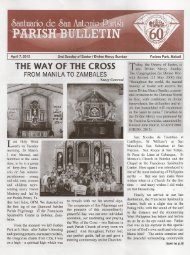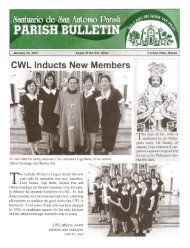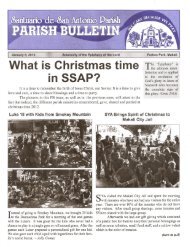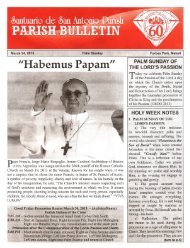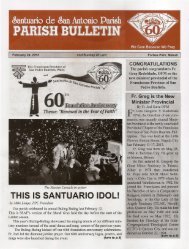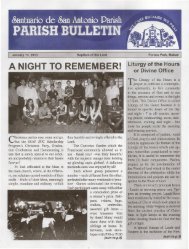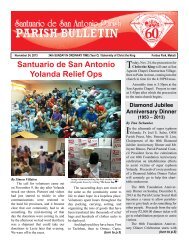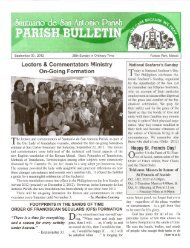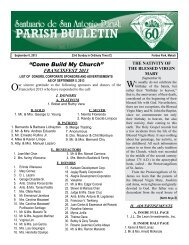When
March 10 - Santuario de San Antonio Parish - WordPress.com
March 10 - Santuario de San Antonio Parish - WordPress.com
- No tags were found...
Create successful ePaper yourself
Turn your PDF publications into a flip-book with our unique Google optimized e-Paper software.
2 Parish Bulletin<br />
Fr. Robert Manansala, OFM<br />
God can never be "offended" by<br />
us. The only thing that can "offend"<br />
Him is when we harm ourselves and<br />
others. As St. Thomas of Aquinas<br />
says, "Weoffend God only inasmuch<br />
as we act against our own good."<br />
Thus, God does not and cannot turn<br />
his back on us. <strong>When</strong> we sin, we are<br />
the ones who turn our backs on Him.<br />
Santuario de San Antonio<br />
Pastoral Team<br />
Fr. Joel Sulse, OFM • Parish Priest<br />
Fr. Greg Redoblado, OFM • Guardian<br />
Fr. Jesus Galindo, OFM • MMC Chaplain<br />
. Bro. Philip Wilhelm, OFM • Procurator<br />
Tel.: 843-8830<br />
website:<br />
www.santuariodesanantonio.wordpress.com<br />
ernall: ssap_info@yahoo.com<br />
Parish Bulletin<br />
Myrna B. Jurilla • Editor<br />
Marilou Consing - Acting Editor<br />
Dawnis C. David • Layout & Production<br />
Email: ssappb@yahoo.com<br />
The Parish Bulletin reserves the right to edit<br />
articles for space and clarity.<br />
GOD'S FORGIVING, ALL-EMBRACING, PATIENT,<br />
SEARCHING AND SEEKING LOVE<br />
Biblical scholars and commentators<br />
say that if we do not have a<br />
copy of the Bible, as long as we have<br />
a copy of Luke 15 and we get its message,<br />
we get the message of the entire<br />
Bible.<br />
The parable of the lost or prodigal<br />
son is one of the three parables in<br />
Luke 15. The other parables are the<br />
parable of the lost sheep and the parable<br />
of the lost coin. Since these two<br />
other parables are paralleled by the<br />
gospel passage on the lost son, it is<br />
obvious that the owner in search of<br />
the lost sheep and of the lost coin represents<br />
God.<br />
The central message of the three<br />
parables in Luke 15 is about the unconditional,<br />
forgiving, all-embracing,<br />
patient, searching and seeking love of<br />
God the Father. In his great poem The<br />
Hounds of Heaven, the English poet<br />
Francis Thompson (1859-1907) pictures<br />
God as Someone in hot pursuit<br />
of the sinner not to avenge the insult<br />
the sinner reaped on Him, not to lambast<br />
the sinner for his or her guilt but<br />
to offer him or her His unconditional,<br />
forgiving and boundless love. The<br />
English mystic Julian of Norwich<br />
says that with and in God, even in<br />
the midst of sinfulness, "all shall be<br />
well."<br />
The parable of the lost son is<br />
a double-edged parable (Patricia<br />
Datchuck Sanchez). The father's<br />
dealing with the younger son is a lesson<br />
of divine mercy and compassion<br />
offered to sinners. In the exchange<br />
between the father and the older<br />
son, we see a strong warning against<br />
those who are self-righteous and cannot<br />
share in God's joy of boundless<br />
goodness over the repentance of sinners.<br />
In the face ofthe father's unconditionallove,<br />
both sons are actually in<br />
need of conversion.<br />
The details of the parable contain<br />
so many powerful and touching<br />
lessons. What is very evident is that<br />
God, as represented by the father in<br />
the story, can never change the way<br />
He relates with us despite our transgressions,<br />
mistakes and sins. He remains<br />
the loving Father who runs after<br />
us even if we run away from Him<br />
and His love.<br />
God can never be "offended" by<br />
us. The only thing that can "offend"<br />
Him is when we harm ourselves and<br />
others. As St. Thomas of Aquinas<br />
says, "We offend God only inasmuch<br />
as we act against our own good."<br />
Thus, God does not and cannot turn<br />
his back on us. <strong>When</strong> we sin, we are<br />
the ones who turn our backs on Him.<br />
<strong>When</strong>ever we read a parable, it<br />
is important that we place ourselves<br />
into the shoes of any of the characters.<br />
At times, we have been the belligerent<br />
younger son. We have also<br />
been the father who is prodigal in<br />
lavishing compassion and forgiveness<br />
on others. We have also played<br />
the part of the resentful and righteous<br />
older son. Indeed, we have played all<br />
these roles. But the big question is -<br />
which of them do we usually play or<br />
live?<br />
T. W. Manson summarizes<br />
the beautiful message of the parable:<br />
"The parable probes the human<br />
psyche andtouches it deeply. It lays<br />
down the fundamental principle of<br />
God's relation to sinful men, that God<br />
loves the sinner while he is still a sinner,<br />
before he repents, and that somehow,<br />
it is this divine love that makes<br />
the sinner's repentance possible."



